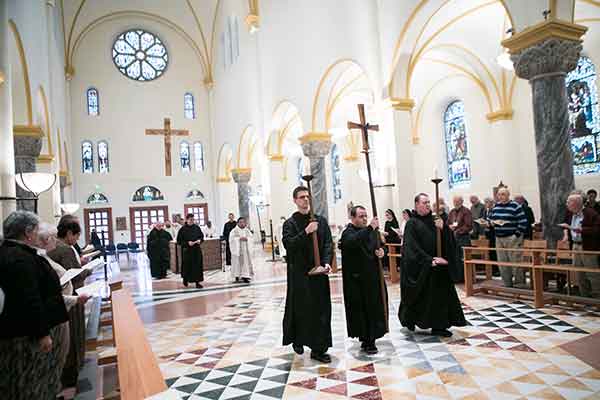Stability in Community
Fr. Adrian Burke, OSB
Thursday, October 5, 2023

"If the community is rather large, some brothers chosen for their good repute and holy life should be made deans...
chosen for their virtuous living and wise teaching, not for their rank..”
Rule of Saint Benedict 21:1;4
“Stability-in-community” is one of the core values of the Benedictine way of life. By our vows of stability, monks commit to a dynamic association of fellow Christians who take their calling seriously, supporting each other in the Spirit of Christ to become true disciples of Jesus for the sake of his mission to bring God’s Kingdom to earth (cf. Rev 21). I’ve written on “stability” before, but this time I want to reflect on how this quintessential monastic value serves as a counterweight to hypercompetitive individualism, and the loneliness and sense of isolation that are its fruits, so prevalent today, especially among young people.
St. Benedict prescribes that larger communities establish “deaneries”, groups of ten monks, headed by brothers chosen not for their rank but for their good example. The deaneries are meant to foster in the brothers a sense of belonging that a large community often fails to provide.
Communities need to resist the tendency to competition and individualism that the broader culture inculcates in its citizenry – such worldly attributes have led many to experience psychological isolation and loneliness, remedies for which are sought through drug and alcohol abuse, internet pornography, and the compulsive use of social media; superficial remedies which only exacerbate the sense of isolation.
There can be no stable (permanently sustained) commitment to a place and a community without a sense of belonging. Benedict’s “deaneries” are a mechanism for establishing and nourishing in each brother a sense of being like a thread, woven or “knotted” into the fabric of the larger community. It’s easy to feel “lost” in a large organization, leading to isolation and loneliness, fomenting a desire to “move on”. Monastic communities, despite the vow of stability, often experience the loss of their members in this way. Leadership must recognize indications of a more organic problem, as Benedict himself seems to have done.
Alexis de Tocqueville, a 19th century French historian and political philosopher, visited our recently established nation and, in 1840, published his observations about our democratic society. “When men are no longer bound among themselves in a solid and permanent manner,” wrote Tocqueville, “one cannot get many to act in common except by persuading each of them that his particular interest obliges him voluntarily to unite his efforts with the efforts of all the others.” Tocqueville sees the need for “stability-incommunity”, a permanent association with others, whereby persons are empowered to resist the temptation to live individualistic, self-absorbed lives, over-against the common good.
There is no guarantee that any particular community can provide the social connectivity needed for individuals to feel truly associated with the whole, the sense of belonging needed to believe that one’s own well-being relies on the well-being of all. The deanery is a small group within the larger community intended to provide members an opportunity to engage at a more intimate, secure level – to discuss, to debate, to encourage, to correct even, when necessary, as a “confessional community” of trusted comrades. The deanery does not displace the need for community-wide meetings, but they can provide what the larger community often cannot – a sense of being heard and accepted, a place to voice one’s views and concerns, in short, a means to experience stability and belonging. When there are no avenues for voicing and being heard, the whole community suffers as members feel more isolated and turn to unwholesome means of abating their loneliness and sense of isolation. In my opinion, every kind of society, religious or secular, could benefit from the wisdom of St. Benedict’s sixth century rule.